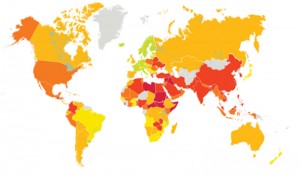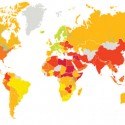Saudi Arabia, Qatar and the United Arab Emirates are among the world’s top 10 worst places when it comes to worker’s rights according to a new study released by the International Trade Union Confederation, but Egypt tops the MENA region as 3rd worst in the world. Study shows rights violations in Israel, and that workers in conflict zones including Palestine and Syria have no rights.
By Ray Hanania

The Gulf States of Saudi Arabia, Qatar and the United Arab Emirates (UAE) are among the world’s top 10 worst countries for workers’ rights, while workers under European austerity measures endured the starkest deterioration of standards, according to the 2015 Global Rights Index released by the International Trade Union Confederation (ITUC).
All of the countries of the Middle East either offer no rights to workers, such as in the three Gulf States, or offer minimal rights with huge policies of violations, according to the report. Asia and Eastern Europe also have major rights violations. Click here to view a detailed country-by-country breakdown of the ITUC Global Rights Index map. Not one MENA country made the Best Ranked List led by Austria, Belgium and Denmark.
The ITUC regional organizations are the Asia-Pacific Regional Organization (ITUC-AP), the African Regional Organization (ITUC-AF) and the American Regional Organization (TUCA). It cooperates with the European Trade Union Confederation, including through the Pan-European Regional Council. ITUC has close relations with the Global Union Federations and the Trade Union Advisory Committee to the OECD (TUAC) and with the International Labour Organization and with several other UN Specialized Agencies.
The ITUC rights index ranks 141 countries against 97 internationally recognized indicators to assess where workers’ rights are best protected, in law and in practice.
“Workers in the Gulf States where the draconian ‘kafala’ system is widespread endure many of the violations which make the Middle East and North Africa the world’s worst region for fundamental rights at work,” said ITUC General Secretary Sharan Burrow.
“But in a worrying trend, European workers have witnessed the starkest deterioration of their rights in the last 12 months due to widespread government-imposed austerity measures taking effect.”
The ten worst countries for working people, according to the report, are Belarus, China, Colombia, Egypt, Guatemala, Pakistan, Qatar,Saudi Arabia, Swaziland and United Arab Emirates. Other countries ranked lower but had worsening conditions this year in a clear negative trend for workers. These nations were Burundi, Dominican Republic, Hong Kong, Iran, Georgia, Russia, United Kingdom and Spain. Click here to view ITUC report and links.
The report doesn’t factor in civil rights challenges facing women in the societies but combined would place Saudi Arabia, Qatar and the UAE at the top of the list in the Gulf. Egypt which has a more progressive respect for women, but has issues, would probably drop further down from the number 3 spot behind Belarus and China.
The International Trade Union Confederation has been collecting data on the abuse of trade union rights around the world for more than 30 years. This is the second year the ITUC has presented its findings through the Global Rights Index, offering a snapshot for government and business to see how their laws and supply chains have deteriorated or improved in the last 12 months.
“Workers in Colombia and Guatemala have been murdered for trying to negotiate better working conditions, while in Qatar and Saudi Arabia migrants continue to endure forced labour and labour law exclusions which amount to modern slavery,” Ms Burrow said.
“In 73 of 141 countries, workers faced dismissals, suspensions, pay cuts and demotions for attempting to negotiate better working conditions, while in 84 countries employers adopted illegal strategies to deny or delay bargaining with representative trade unions. While a handful of countries have attained perfect scores compared to last year, there’s been an increase across the board in the number of countries where conditions have worsened, including nations such asCameroon, Hungary, Spain and South Africa.”
The reports key findings include:
• Out of a total of 141 countries, the number where workers faced arbitrary arrest and detention increased from 35 to 44, and included countries such as Spain and Brazil.
• In almost 60 per cent of countries, certain types of workers are excluded from their fundamental labour rights.
• Unionists were murdered in 11 countries, one up from last year, including 22 deaths in Colombia alone.
• Seventy per cent of countries have workers with no right to strike.
• Two thirds of countries deny workers collective bargaining rights.
• More than half of countries in the survey deny workers access to the rule of law.
In the past year, unions have reported violent crackdowns on peaceful protests in Cambodia, Costa Rica,Paraguay and Ukraine; in Qatar around 100 migrant workers striking against poverty wages were arrested last November, while in March this year a Filipino union organizer became the 18th case of extra-judicial killing since 2010.
“International labour standards prescribe access to fundamental rights for all workers,” Ms Burrow said. “Yet as corporate power and inequality grows internationally, these results show governments and employers in almost every country around the world must improve their treatment of workers and arrest the increase in workplace violations.”
The 2015 ITUC Global Rights Index rates countries from one to five according to 97 indicators, with an overall score placing countries in one to five rankings.
1. Irregular violations of rights: 16 countries including Finland & Uruguay
2. Repeated violations of rights: 26 countries including Japan & Ireland
3. Regular violations of rights: 36 countries including Israel & Australia
4. Systematic violations of rights: 27 countries including Poland & USA
5. No guarantee of rights: 27 countries including Belarus, China & Nigeria
5+ No guarantee of rights due to breakdown of the rule of law: nine countries including Syria, Central African Republic & Palestine
The International Trade Union Confederation (ITUC) describes itself as the global voice of the world’s working people. The ITUC’s primary mission is the promotion and defense of workers’ rights and interests, through international cooperation between trade unions, global campaigning and advocacy within the major global institutions.
Its main areas of activity include the following: trade union and human rights; economy, society and the workplace; equality and non-discrimination; and international solidarity. The ITUC adheres to the principles of trade union democracy and independence. It is governed by four-yearly world congresses, a General Council and an Executive Bureau.


- Israelisnipers shooting and killing hospital workers in Gaza - December 11, 2023
- CAIR Condemns Israeli Executions of Wounded, Unarmed Palestinian in West Bank - December 11, 2023
- Arab and Muslim American voters face a “simple choice” between Biden’s inhumanity and Trump’s edgy politics - December 9, 2023
























